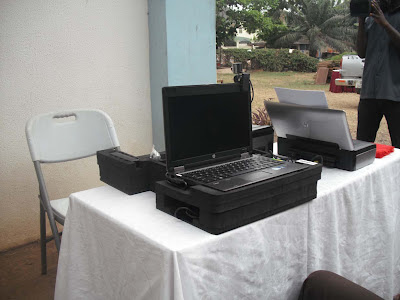Ghana will do biometric registration, not biometric voting - Dr. Afari-Gyan
BY EDMUND SMITH-ASANTE
Responding to the consternation and controversy that have emanated since the Electoral Commission of Ghana declared its intention to go biometric, Dr. Kwadwo Afari-Gyan, the EC’s Chairman, has stressed that the country will only do biometric registration of voters and not biometric voting as has been widely rumoured.
“If that is biometrically identified on Election Day, it will mean that the person can vote only once and under his/her own name. That will put an end to the problem of voter impersonation,” Dr. Afari-Gyan stressed.
 |
| Equipment for Ghana's Biometric Registration |
Responding to the consternation and controversy that have emanated since the Electoral Commission of Ghana declared its intention to go biometric, Dr. Kwadwo Afari-Gyan, the EC’s Chairman, has stressed that the country will only do biometric registration of voters and not biometric voting as has been widely rumoured.
He said the voting process of 2008 where ballots were cast manually will still be maintained, once biometric data of all eligible voters who avail themselves to be registered is compiled.
Dr. Afari-Gyan assuaged the fears of Ghanaians, when he spoke on the topic, “Election 2012: The EC’s preparations so far” at a dialogue organised by the Editors Forum, Ghana (EFG), an association of Editors and senior journalists affiliated to the Ghana Journalists Association (GJA), and which has as its Chair, former GJA President, Ajoa Yeboah-Afari, in Accra yesterday.
Demystifying the biometric technology, he said it is the use of computer methods to identify persons by means of their unique features.
“In terms of identifying people, biometric technology may be used for civil or forensic purposes: and different standards and controls govern the application of the technology in each area,” he added.
According to Dr. Afari-Gyan, it is the civil type of biometrics that will be used in the registration of voters, and while the 2012 voter registration will represent a changeover to a new system, not every aspect of the registration system will be new.
“In fact, what will be new, is the manner in which the fingerprints and pictures of applicants will be taken. Alongside the biographic data of the applicant, the ten fingerprints and the photograph will be taken digitally. For the ordinary person, that is what makes the registration biometric,” he said.
Making a case for biometric technology, he said it is popular with mass registrations like voter registration, because it is easier and cheaper to deploy than others, is the most reliable, having been tested for about 30 years and is the least intrusive biometric method.
Touching on the issue of verification which has also been shrouded in confusion, he said technically it is not a registration matter, but intended to guard against voter impersonation during elections.
Saying it is the same as identification, the EC boss explained that “The issue of verification arises after a person who has been registered comes to vote”, adding, “What we are hoping to do is a biometric verification of the voter at the point of the ballot.”
He stated that for a biometric registration to be tagged as successful, it will mean the registered person’s name should appear only once in the voters register and at a specific polling station.
 |
| EC Chair, Dr. Afari-Gyan |
He however warned, “Any multiple registrations anywhere in Ghana will be found out, through a full search of the fingerprints and photographs of the registered voters.”



Comments
Post a Comment